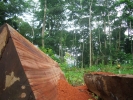 Alan Oaxley has a mission in his life: deforestation. He probably never used a chainsaw, but he uses the pen, or -better- the computer. His two public relations companies, World Growth International (disguised as humanitarian NGO) and ITS Global, are in the front line advocating deforestation. Behind them, the customers: companies which make profits from deforestation, companies with very bad environmental records such as the Malaysian logging giant Rimbunan Hijau and the Indonesian paper group Asia Pulp & Paper. But what happens if some of its customers decide to adopt a greener policy? They fall under his ax.
Alan Oaxley has a mission in his life: deforestation. He probably never used a chainsaw, but he uses the pen, or -better- the computer. His two public relations companies, World Growth International (disguised as humanitarian NGO) and ITS Global, are in the front line advocating deforestation. Behind them, the customers: companies which make profits from deforestation, companies with very bad environmental records such as the Malaysian logging giant Rimbunan Hijau and the Indonesian paper group Asia Pulp & Paper. But what happens if some of its customers decide to adopt a greener policy? They fall under his ax.
It is the case of Golden Agri Resources (GAR), Indonesia's largest palm oil producer, for signing a commitment to protect high conservation value forests and carbon rich peatland, and to require free, prior informed consent (FPIC) in working with communities potentially affected by oil palm development. Golden Agri is part of the Sinar Mas conglomerate, which controls also the paper gant Asia Pulp and Paper.
Last year, Alan Oxley was paid by the Sinar Mas group to counter a report released by Greenpeace on APP practices. Now, Alan Oaxley did not appreciate the new step taken by the Sinar Mas palm oil subsidy. According World Growth's newsletter of March, the agreement "could severely hamper the company's growth" by limiting where it can establish new plantations and says that negotiating with multiple stakeholders "will delay and complicate any investment by the company." The conclusion is that the company will be forced to renege its own commitment.
The same newsletter from World Growth International denies that the expansion of palm oil plantations is destroying peatlands. "Palm plantations are generally not suited to peat lands", it states, pretending to ignore that more than one million hectares of peatlands have been converted into oil palm plantations in Indonesia and Malaysia. Most of the lowland forest on mineral soil are gone, and what still remains abundantly are the peatforests, the so-called marginal lands, still relatively untouched by the industrial development. In the contrary, palm oil yields on peat soils can be competitive with plantations on mineral soils. Furthermore, Alan Oxley is contradducting himself: in a recent article published in the Jakarta Post, Oxley criticized the agreement signed between Indonesia and Norway, aimed to stop deforestation: protecting peatland forests in Central Kalimantan, according to him, will destroy the palm oil industry: "Any expansion of oil palm will have to await the agrarian reform. Then oil palm will grow only on degraded land that will become available," he wrote.
World Growth International is well known for its tailored reports for using quotations in an unscrupulous way.
- Last November, Nobel Prize Wangari Maathai's Green Belt Movement International, blasted World Growth International's Oxley for using her name to imply that she supports the large-scale conversion of tropical forests for industrial plantations.
- Two of the reports released by World Growth International misattribute views to Frances Seymour, the Director General of CIFOR. World Growth International said Seymour, when speaking at a U.N. Food and Agriculture Organization event in 2009, blamed subsistence farmers for most deforestation, but a review of the transcript from her talk does not support this interpretation. Speaking with mongabay.com, Seymour flatly denied the notion that the poor are primarily to blame for deforestation today.
- In December 2010, Agus Purnomo, Indonesian President Susilo Bambang Yudhoyono's special assistant on climate change, said Oxley was misrepresenting the objectives of Indonesia's proposed moratorium on new concessions in primary forest areas and peatlands.
- In October, a group of prominent scientists castigated Oxley. In an open letter the scientists identify World Growth International and ITS Global as front groups for the palm oil, timber, and wood-pulp industries. "A number of the key arguments of World Growth International, ITS Global, and Alan Oxley, represent significant distortions, misrepresentations, or misinterpretations of fact - wrote the scientists, led by William F. Laurance, a researcher at James Cook University - In other cases, the arguments they have presented amount to a 'muddying of the waters' which we argue is designed to defend the credibility of the corporations we believe are directly or indirectly supporting them financially. As such, World Growth International and ITS Global should be treated as lobbying or advocacy groups, not as independent think-tanks, and their arguments weighted accordingly."
But these criticisms cannot stop Alan Oaxley and its organizations to flood the media with low quality "reports" advocating deforestation and denying the emissions from conversion of peatlands for plantations as well as the loss of habitat for threatened species including orangutans and Sumatran tigers. No news, so far. What is really new is that now Alan Oaxley, is not only attacking environmental groups and scientists, but also the companies which - instead of using his well paid services - try to reduce their impact on forests. Is it also a message to its customers which are planning to become former-customers?


